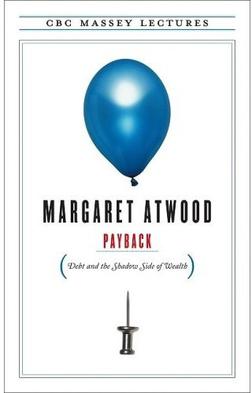Payback!
It’s 10 years since the Lehman Brothers crash, and all that that brought with it. On Friday I’m going to see the Lehman Trilogy at the National Theatre , to see how a quality dramatisation of events can shed new light on what happened. I’m not sure how good it will be for my blood pressure, but I’m looking forward to it in any case.
In this post I want to draw attention to another literary work – Payback, by Margaret Atwood. This was published exactly at the time the world was crashing into financial chaos, and its subtitle is stunningly prescient: Debt and the Shadow Side of Wealth. I found it a simply wonderful demonstration of how an author best known for her fiction can bring her talents to bear directly on contemporary issues of major political importance, and provide new illumination. I see that Atwood has written other non-fiction (including the intriguingly titled Negotiating with the Dead, which as an amateur thanatologist I must now read), but my guess is that this is her boldest venture yet in that sphere.
 She begins with reflections on the origins of the concept of debt, and whether there were evolutionary pressures to develop the kind of reciprocal, if often unfair and bloody, relationships that debt involves. She then turns to look at debt as sin, reflecting on how many people regarded any form of debt as sinful, and recording her own sense of shock discovering that her own father, a man of impeccable rectitude, had actually visited a pawnbroker (although it turns out that this was for an acceptable moral purpose). Apparently poor people were employed, in Shropshire, Scotland and Wales and perhaps elsewhere, to eat the sins of the deceased – they actually received food in return for helping the dead person make a smooth transition. Typically, Atwood draws on Milton, Orwell and other literature, both fiction and anthropology, to make the point.
She begins with reflections on the origins of the concept of debt, and whether there were evolutionary pressures to develop the kind of reciprocal, if often unfair and bloody, relationships that debt involves. She then turns to look at debt as sin, reflecting on how many people regarded any form of debt as sinful, and recording her own sense of shock discovering that her own father, a man of impeccable rectitude, had actually visited a pawnbroker (although it turns out that this was for an acceptable moral purpose). Apparently poor people were employed, in Shropshire, Scotland and Wales and perhaps elsewhere, to eat the sins of the deceased – they actually received food in return for helping the dead person make a smooth transition. Typically, Atwood draws on Milton, Orwell and other literature, both fiction and anthropology, to make the point.
‘Debt as Plot’ is a theme which makes immediate sense for her to tackle, starting with Faustus and Scrooge. Money drives plot as much as love does. Atwood’s turn of phrase sparkles:
The best nineteenth century revenge is not seeing your enemy’s red blood all over the floor but seeing the red ink all over his balance sheet.
Debtors must have creditors. The two are terrible Siamese twins (though often of grossly different dimensions), or what Atwood calls the shadow side. Dickens figures again, of course, and Shylock, with all the psychological implications of the debt relationship.
The final chapter is ‘payback’. Here Atwood imagines a future Scrooge – Scrooge Nouveau, with four ex-wives, whose A$$hole behaviour (Atwood plays with this kind of text) is supposedly in the past. She talks us through his encounter with a female Spirit of Earth Day Past who takes him on a journey through history and hands him to a male Spirit of Earth Day Present, and then to a Future. Ex-A$$hole Scrooge’s expensive food curdles in his guts as he contemplates the prospect. There is a qualified redemption at the end, as Scrooge realises he still has time to make amends – but Atwood concludes with a sober note on the non-fictional world:
Maybe it’s time for us to think about it differently. Maybe we need to count things, and add things up, and measure things, in a different way. In fact, maybe we need to count and weigh and measure different things altogether.
Put that next to the ludicrous slicing and dicing of financial products which triggered the 2008 crash and it rings very very true. Atwood was of course far from the first to make the point she makes in this passage. But she does it in such an extraordinarily humanistic way, if I can use a rather ugly term to describe how widely she draws on human experience, that her book has immense power.
If only more men had read it at the time. Which is where the link to Lehman Brothers comes back in, and the connection to the Paula Principle . I do think that Lehman Sisters would not have brought so much damage (to people other than themselves – as is now being well chronicled, almost all those responsible have escaped to other equally lucrative positions). But the broader point is that the way we count, measure and value things is heavily influenced by the culture we operate in; and this includes the skills and competences we count, measure and value. We don’t do it well, or fairly.
